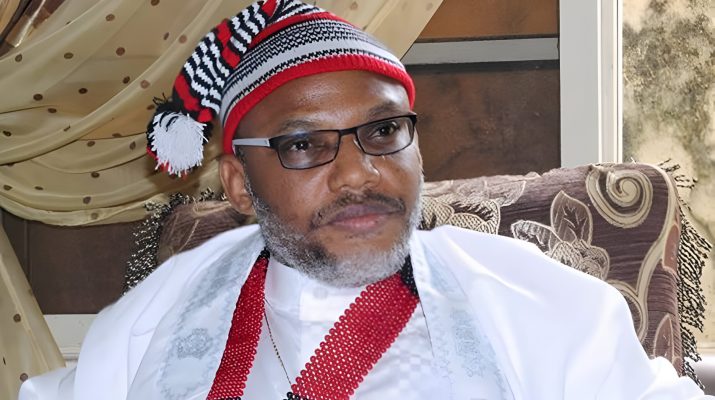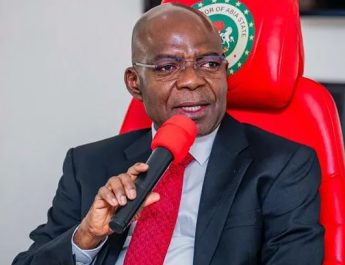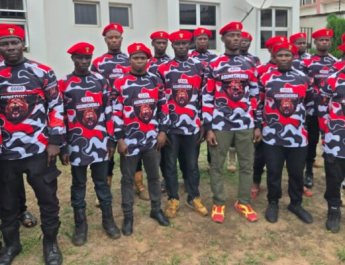Following Justice James Kolawole Omotosho’s insistence that Onyendu Nnamdi Kanu must remain in the custody of the Department of State Service (DSS) to continue to defend allegations of terrorism leveled against him by the Federal Government contrary to the established principles of law amid issues of his deteriorating health, many citizens sound warning alerts to Present Bola Ahmed Tinubu government to the effect that the promoter of the Indigenous People of Biafra (IPOB) must not die in detention due to what they term dire consequences of such occurrence
By Udoka Ekeleme, Abuja
The decision of Justice James Omotosho of the Federal High Court, Abuja, on Friday, September 26, 2025, that Mazi Nnamdi Kanu must remain in detention at the Department of State Service (NCS) to defend himself against the Federal Government’s allegation of terrorism despite growing concerns about his failing health, has aroused protests and condemnation against the government and the country’s judiciary which has been accused of partiality in justice delivery.
Firing its salvo last week against the continued incarceration of Kanu despite his health condition, the National Association of Nigerian Students (NANS) had taken to the streets last week in Abuja to protest the illicit and malicious treatment being meted out to the Biafra agitator by a conspiracy of the presidency and the judiciary.
The Association on Wednesday, October 1, 2025 staged a peaceful protest in Abuja to demand the unconditional release of the detained leader of the Indigenous People of Biafra (IPOB), Kanu. The students’ body warned that should Kanu pass on while in detention for mere agitation, the country may not remain the same again.
The NANS faction led by its National President, Comrade Atiku Isah (GCNS), said they were deeply concerned about what they described as “injustice” surrounding Kanu’s prolonged detention despite court rulings granting him bail.
Speaking during the protest, Isah said, “We find it difficult to understand why Mazi Nnamdi Kanu is still in detention when courts of competent jurisdiction have granted him bail before. Justice delayed is justice denied.”
He criticized the government for what he called double standards in handling issues of national concern, pointing out that while armed groups were being engaged in dialogue, Kanu was still held in custody.
The NANS leader added, “A few weeks ago, bandits displaying dangerous weapons sat with government representatives to negotiate the return of peace after killing many people and destroying properties.
“Yet, Mazi Kanu, who only spoke out and demanded fair treatment for his people, is being treated like a criminal.
“It is the right of all Nigerians who are aggrieved to speak up. NANS will continue to protest injustice because an injury to one is an injury to all.
“Today being October 1st is historic, and we urge President Tinubu to grant our request in the interest of justice, peace, and unity.”
The protest ended peacefully with the students vowing to sustain their demand until, in their words, “justice is served” where Kanu who has been in detention since 2021 would be released.
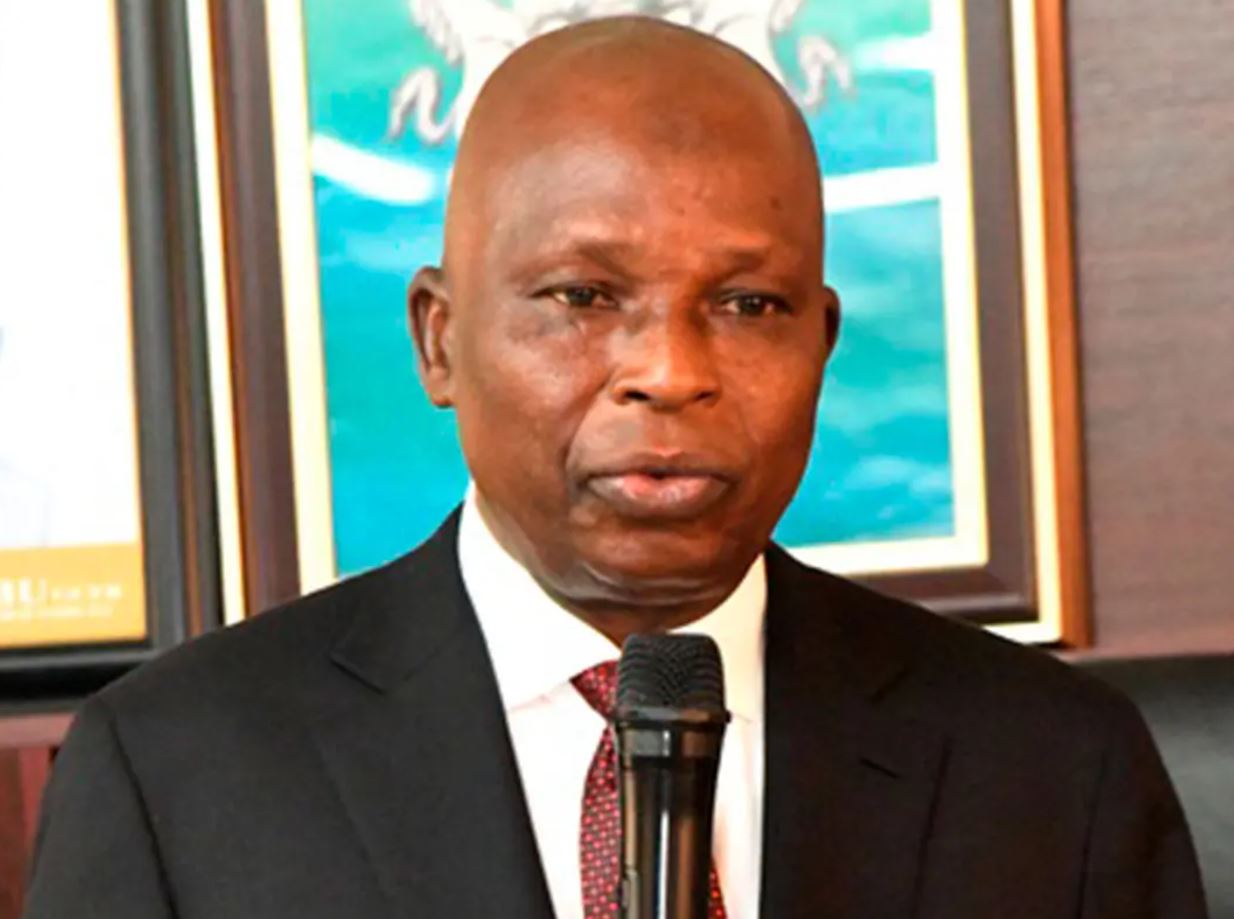
Barrister Christopher Chidera, a Human Rights Lawyer and Public Advocate said the ruling of Justice Omotosho on Friday, September 26, 2025 dismissing Kanu’s ‘No Case Plea’ against terror allegations, while insisting that the IPOB agitator has case to answer, is a mockery of the law.
In an article, recently published online, Chidera said, “We express deep concern over the ruling delivered by Justice Omotosho of the Federal High Court, Abuja, in the ongoing case of Mazi Nnamdi Kanu. The court’s declaration that Kanu “has to explain certain things in his broadcasts” departs alarmingly from established legal principles and reveals a troubling pattern of executive interference in Nigeria’s judiciary.
“Under the Administration of Criminal Justice Act (ACJA) 2015, a no-case submission requires the court to evaluate both the charges and the quality of the prosecution’s evidence. Justice Omotosho’s ruling, however, focused narrowly on the charge sheet while disregarding the prosecution’s evidence, which had collapsed under cross-examination due to contradictions and inconsistencies.
“Supreme Court precedents make it clear: when prosecution witnesses are discredited, a trial court must acknowledge that the case has failed. By sidestepping this obligation, Justice Omotosho undermined the integrity of judicial scrutiny.
“Equally disturbing is the court’s silence on the prosecution’s reliance on the repealed Terrorism Prevention (Amendment) Act 2013. Section 122 of the Evidence Act 2011 requires courts to take judicial notice of repealed laws. Any prosecution anchored on a defunct statute is a legal nullity.
“By allowing this case to proceed under a repealed law, the ruling calls into question the court’s jurisdiction and its fidelity to the rule of law”.
Chidera further argued, “The Nigerian Constitution, under Section 36(11), guarantees that no defendant shall be compelled to testify against himself. Yet, Justice Omotosho’s ruling effectively shifts the burden of proof from the prosecution onto the accused, despite the absence of credible investigation reports or substantive evidence.
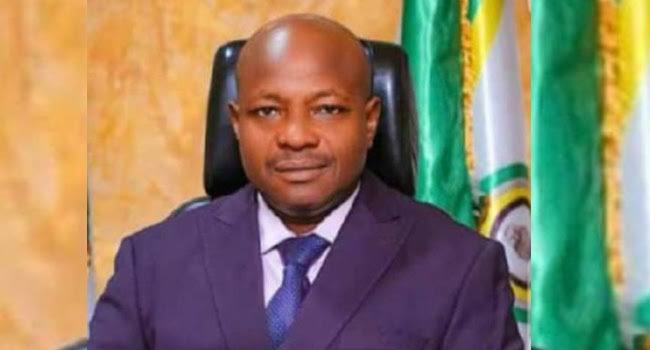
This dangerous precedent erodes fair trial guarantees and weakens constitutional protections for all Nigerians.
“Taken together, these legal failures suggest a disturbing trend: the judiciary in Abuja increasingly appears to serve political interests rather than impartial justice. Courts are meant to be guardians of the Constitution, not instruments of executive power.
“Such rulings corrode public confidence in Nigeria’s judicial system and undermine the international credibility of the country’s commitment to due process”.
Also lending its voice to the malicious treatment against Kanu by the Federal Government and the judiciary arm, the Igbo Veterans in U.S. has slammed the Abuja Court over its ruling against Kanu.
The Legal Department of the American Veterans of Igbo Descent also faulted the ruling of Justice Omotosho on the no case submission of Kanu. The Department, under the authority of its president, Dr. Sylvester Onyia, on Sunday, September 28, 2025 said the ruling remained one of the most troubling examples of judicial dereliction in recent history.
The body posited that the Judge failed to read the regulating statutes, the ACJA 2015 and the Evidence Act 2011, accusing the judge of being afraid of doing justice, averse to truth, and contemptuous of God, in whose name he took his judicial oath.
It added that the first law Omotosho Ignored was the ACJA 2015, Section 303(3)(a)-(d), adding that in Nigerian jurisprudence, the foundational statutory test for a no-case submission is crystal clear.
The American Veterans of Igbo Descent further maintained that the Witnesses had admitted under oath they had never met Kanu before, save for seeing him in court adding that no investigation was carried out into the allegations. It further stressed that no evidence linked Kanu to any offence neither anyone testified that Kanu incited them.
The group described the ongoing trial as a pathetic charade and not prosecution claiming that the judge trampled on section 36 of the 1999 Constitution, which guarantees a fair trial. It described the ruling as not law, but a perversion of justice, which betrayed the faith of the people in the Judiciary.
Another prominent legal analyst, Njoku Jude Njoku, has issued a detailed public briefing note, outlining the legal missteps that he said were responsible for the prolonged incarceration of the IPOB leader—despite a Supreme Court ruling in December 2023.
Njoku, a member of the Mazi Nnamdi Kanu Global Defence Consortium based in London, squarely blamed the former legal team, particularly under the leadership of Mike Ozekhome SAN, for allowing a case that was effectively dead to be reopened by the Federal Government.
Njoku argued that the pivotal mistake occurred after the Court of Appeal discharged Kanu on 13 October 2022 on jurisdictional grounds, citing his illegal rendition from Kenya. Instead of defending that ruling as final and binding, Njoku said, the defence team allowed the government to appeal using Order 6 Rule 1 of the Court of Appeal Rules—a procedure meant for civil, not criminal, matters.
“This was a colossal legal blunder,” Njoku wrote, asserting that by entertaining the government’s appeal, Kanu’s legal team gave life to a case that should have been legally dead.
Njoku also debunked the former Attorney-General Abubakar Malami’s controversial claim that Kanu’s discharge did not amount to an acquittal. He cited multiple legal authorities, including the Supreme Court decision in FRN v. Osahon (2006), which affirmed that a court lacking jurisdiction renders its proceedings and verdict null and void.
“In Kanu’s case, the discharge was due to lack of jurisdiction—making it final and equivalent to an acquittal,” he explained.
Another major flaw Njoku identified is the government’s decision to proceed with Kanu’s trial under the Terrorism Prevention Act (TPA) of 2013, which had already been repealed by the Terrorism (Prevention and Prohibition) Act (TPPA) of 2022. Njoku explained that while the TPPA provides for the continuation of existing proceedings, it only applies to cases that were still pending, not those already terminated by a competent court.
“You can’t revive a dead case,” Njoku stated, referencing Section 6(1)(c) of Nigeria’s Interpretation Act 1964, which bars the revival of terminated legal proceedings following the repeal of an enabling statute.
The IPOB has also strongly condemned Justice Omotosho over his controversial remarks in the ongoing trial of Kanu.
The IPOB said in a statement signed by Emma Powerful, its spokesman, “During proceedings on Friday, Justice Omotosho reportedly declared that “the defendant will need to explain certain things.” IPOB finds this statement not only legally unfounded but also a direct violation of the Nigerian Constitution and international standards of justice.
“We pose this question to Justice Omotosho: Explain what exactly?
“Is the judge unaware that Section 36(11) of the 1999 Constitution clearly states that no defendant can be compelled to give evidence against himself?
“Does he not understand that under Nigerian and international law, the burden of proof rests entirely with the prosecution?
“Or is he deliberately suggesting that Mazi Nnamdi Kanu should step in to cover up for a case riddled with contradictions, lacking credible witnesses, missing investigation reports, and anchored on a repealed law?
“This remark does not reflect impartial justice. It instead exposes the reality of the Abuja judiciary: a system more loyal to government dictates than to the principles of fairness. By insisting that our leader must “explain,” Justice Omotosho is not applying the law—he is aiding political persecution.
“We wish to remind Nigerians and the international community that Mazi Nnamdi Kanu and IPOB remain committed to truth, justice, and the right to self-determination, which is enshrined under international law, including the UN Charter. The attempt to shift the burden of proof onto an innocent man is nothing short of judicial misconduct.
“We call on the global community, human rights organizations, and lovers of freedom worldwide to take note of this growing pattern of judicial compromise in Nigeria. The ongoing trial of Mazi Nnamdi Kanu has once again become a test case for whether Nigeria’s courts can act independently, or whether they will continue to function as an extension of political repression.
“The Nigerian judiciary must put an end to this charade. Justice cannot be served by intimidation, manipulation, or bias. Mazi Nnamdi Kanu’s only “crime” is peacefully demanding the right of Biafrans to determine their future”.
The IPOB has equally issued a stern warning to President Bola Tinubu and the DSS, insisting that Nigeria risked a major crisis if its detained leader, Kanu, who is seriously ailing at the DSS custody, is not given urgent medical attention.
The group declared that Kanu’s health and safety remained “non-negotiable” and accused the authorities of endangering his life through judicial rascality and neglect.
In a statement issued on Tuesday, September 30, IPOB’s spokesperson, Emma Powerful, described Kanu as priceless, stressing that the government must take responsibility for his well-being.
The statement said, “Let it be clearly understood: Mazi Nnamdi Kanu is priceless, and no amount of blackmail, judicial rascality, or DSS-induced health crisis will be tolerated.”
Powerful warned that any further deterioration in Kanu’s health could trigger consequences “unimaginable for Nigeria and its foreign backers.”
The IPOB spokesman drew a parallel with the 1914 assassination of Archduke Franz Ferdinand, which ignited the First World War.
“When Serbian nationalists assassinated Archduke Franz Ferdinand in Sarajevo in 1914, they thought there would be no consequences. The result was the First World War, which consumed over 10 million lives,” Powerful cautioned.
He added: “Nigeria is toying with a catastrophe that could engulf not only its borders but the entire region. A worsening of Kanu’s medical condition will ignite a crisis the likes of which Nigeria and its foreign backers have never imagined.
“The games being played with the life of Mazi Nnamdi Kanu are reckless, provocative, and unsustainable. Nigeria is sitting on a keg of gunpowder, and IPOB will not be held responsible for what happens if this provocation continues,” the group stated.
President Tinubu has also been urged to grant Kanu a conditional release from prison as a purposeful step towards reconciliation and national healing.
Professor Christopher Chinedumuije, a professor of Disaster Management and Humanitarian Studies, made the call in an open letter to President Tinubu.
According to him, “as a concerned citizen, a patriot, and a believer in the indivisibility of our great nation, Nigeria, I am compelled to address you on a matter that has continued to agitate the minds of millions of Nigerians, particularly in the Southeast region — the continued detention of Mazi Nnamdi Kanu, leader of one of the South east geopolitical zone activist groups – Indigenous People of Biafra (IPOB).”
“It is in the spirit of these values, and with a deep sense of responsibility, that I appeal to you to consider the conditional release of Mazi Nnamdi Kanu as a strategic step towards healing, reconciliation, and peacebuilding in our nation.”
Chinedumuije, stated that Nigeria has endured years of conflict, agitations, and secessionist tensions, stating that the South East has been one of the most volatile regions in recent years, with sit-at-home orders, violent clashes, and economic disruptions affecting millions of citizens.
He stated that while the government has every right to enforce law and order, “we must recognize that sustained peace is rarely achieved through force alone but through dialogue, inclusion, and trust-building.”

